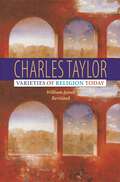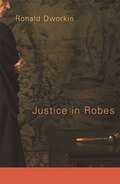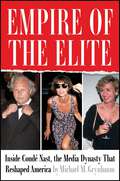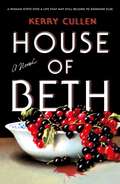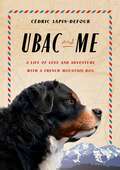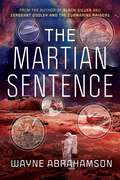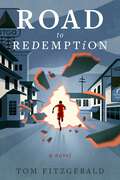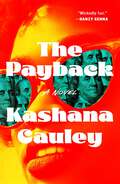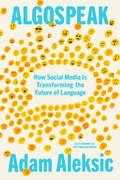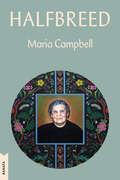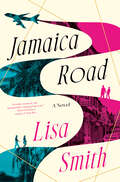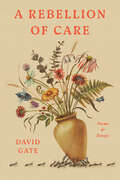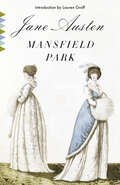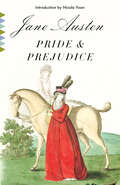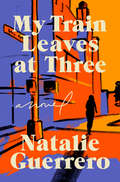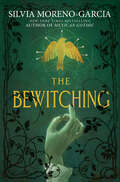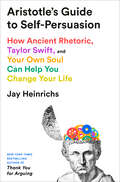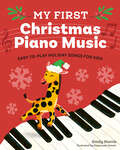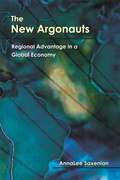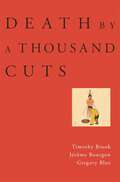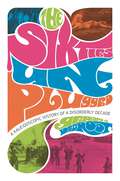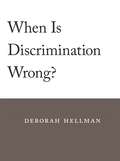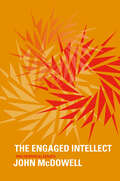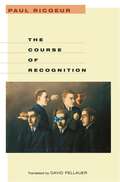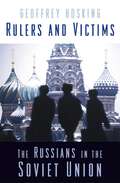- Table View
- List View
Varieties of Religion Today: William James Revisited (Institute for Human Sciences Vienna lecture series)
by Charles Taylor“Varieties of Religion Today is a provocative, witty, and worthy conversation with James’s timeless work.” —Publishers WeeklyA hundred years after William James delivered the celebrated lectures that became The Varieties of Religious Experience, one of the foremost thinkers in the English-speaking world returns to the questions posed in James’s masterpiece to clarify the circumstances and conditions of religion in our day. An elegant mix of the philosophy and sociology of religion, Charles Taylor’s powerful book maintains a clear perspective on James’s work in its historical and cultural contexts, while casting a new and revealing light upon the present.Lucid, readable, and dense with ideas that promise to transform current debates about religion and secularism, Varieties of Religion Today is much more than a revisiting of James’s classic. Rather, it places James’s analysis of religious experience and the dilemmas of doubt and belief in an unfamiliar but illuminating context, namely the social horizon in which questions of religion come to be presented to individuals in the first place.Taylor begins with questions about the way in which James conceives his subject, and shows how these questions arise out of different ways of understanding religion that confronted one another in James’s time and continue to do so today. Evaluating James’s treatment of the ethics of belief, he goes on to develop an innovative and provocative reading of the public and cultural conditions in which questions of belief or unbelief are perceived to be individual questions. What emerges is a remarkable and penetrating view of the relation between religion and social order and, ultimately, of what “religion” means.
Justice in Robes
by Ronald DworkinHow should a judge’s moral convictions bear on his judgments about what the law is? Lawyers, sociologists, philosophers, politicians, and judges all have answers to that question: these range from “nothing” to “everything.”In Justice in Robes, Ronald Dworkin argues that the question is much more complex than it has often been taken to be and charts a variety of dimensions—semantic, jurisprudential, and doctrinal—in which law and morals are undoubtedly interwoven. He restates and summarizes his own widely discussed account of these connections, which emphasizes the sovereign importance of moral principle in legal and constitutional interpretation, and then reviews and criticizes the most influential rival theories to his own. He argues that pragmatism is empty as a theory of law, that value pluralism misunderstands the nature of moral concepts, that constitutional originalism reflects an impoverished view of the role of a constitution in a democratic society, and that contemporary legal positivism is based on a mistaken semantic theory and an erroneous account of the nature of authority. In the course of that critical study he discusses the work of many of the most influential lawyers and philosophers of the era, including Isaiah Berlin, Richard Posner, Cass Sunstein, Antonin Scalia, and Joseph Raz.Dworkin’s new collection of essays and original chapters is a model of lucid, logical, and impassioned reasoning that will advance the crucially important debate about the roles of justice in law.
Empire of the Elite: Inside Condé Nast, the Media Dynasty That Reshaped America
by Michael M. GrynbaumFrom a New York Times media correspondent, a dishy history of the Condé Nast magazine empire, home of Vogue, Vanity Fair, The New Yorker, and more, focusing on its glitzy heyday from the 1980s through the 2000s.For decades, Condé Nast and its glittering magazines defined how to live the good life in America. The brilliant, complicated, striving characters behind Vogue, Vanity Fair, The New Yorker, GQ, Architectural Digest, and many other titles manufactured a vision of luxury and sophistication that shaped consumer habits, cultural trends, intellectual attitudes, and political beliefs the world over. Condé&’s billionaire owner Si Newhouse and his stable of star editors, photographers, and writers were the gatekeepers who decided what and who mattered, and they offered those opinions to tens of millions of readers every month. They were the ultimate influencers—before social media changed everything. The magazines crowned celebrities by the dozens, patronized creative talent much as the Medicis had underwritten Renaissance artists, and supercharged opulent events like the Vanity Fair Oscar Party and the Met Gala, which came to rival any fete that Louis XIV ever hosted at Versailles. The book is full of fresh behind-the-scenes reporting about a plethora of boldface names and sets out to explain how Condé Nast established itself as a de facto American aristocracy, anointing an elite and dictating the culture they presided over. The colorful story of Condé Nast at its zenith and the profound way it influenced how Americans aspired to look, eat, decorate, date, marry, and even think, has never been examined deeply. Empire of the Elite is the first book-length history of an empire whose publications refashioned American notions of prestige, whose editors became celebrities themselves, and whose diminution offers a cautionary tale of class, hubris, and technological change, even as its aesthetic and ethos remain influential to this day.
House of Beth
by Kerry CullenA haunting and seductive tale of a young career woman who slides quickly into the role of stepmother, in a life that may still belong to someone else. &“Vivid, addictive, and crackling with life (yes, even the ghost), House of Beth asks us to consider how and why we make the lives we make&” (Lynn Steger Strong).After a heart-wrenching breakup with her girlfriend and a shocking incident at her job, Cassie flees her life as an overworked assistant in New York for her hometown in New Jersey, along the Delaware. There, she reconnects with her high school best friend, Eli, now a widowed father of two. Their bond reignites, and within a few short months, Cassie is married to Eli, living in his house in the woods, homeschooling the kids, and getting to know her reserved neighbor, Joan. But Cassie&’s fresh start is less idyllic than she&’d hoped. She grapples with harm OCD, her mind haunted by gory, graphic images. And she&’s afraid that she&’ll never measure up to Eli&’s late spouse, who was a committed homemaker and traditional wife. No matter what Cassie does, Beth&’s shadow still permeates every corner of their home. Soon, Cassie starts hearing a voice narrating the house&’s secrets. As she listens, the voice grows stronger, guiding Cassie down a path to uncover the truth about Beth&’s untimely death.
Ubac and Me: A Life of Love and Adventure with a French Mountain Dog
by Cédric Sapin-DefourThe international sensation, a charming and moving memoir of a dog&’s transformative love.&“Having a dog as company makes nothing feel excessive—not time or space. It&’s not even about passing time, but being of it.&” A tiny ad in a local newspaper catches Cedric Sapin-Defour&’s eye: a litter of Bernese Mountain Dog puppies need homes. A lonely, single gym teacher and mountain climber in the French Alps, Cedric visits the dogs and immediately falls for a puppy with a blue collar who steps over his siblings to get to him. Named Ubac, French for the north side of the mountain—the rainy, cloudy slope—the puppy quickly upends Cedric&’s life. They go on hikes together, taking to the hills and exploring, forging a bond that brings joy and a sense of fulfillment and adventure. They brave the world together, hate to be apart, crave the mountains and the natural world; they protect each other. Over the course of thirteen years, their pack expands to include Mathilde, Cedric&’s wife, and more dogs. Ubac and Me is an intimate meditation on a joyous life lived too fast, the aching pain of separation, and the transformative effect of unconditional love. A dog named for the rainy side of the mountain is an inspiring lesson in how walking the rocky, cloudy hills together can bring the greatest light, the sunniest joys, even if the shared journey is unbearably short.
The Martian Sentence
by Wayne AbrahamsonIn The Martian Sentence, an ancient artifact sparks a race across time and space. From the ruins of Mesoamerica to the red sands of Mars, Wayne Abrahamson delivers a gripping sci-fi thriller where the fate of humanity rests in the hands of unlikely heroes—and the secrets of time itself.Racing against each other, two teams of explorers embark on a quest for an ancient cylinder rumored to hold the secrets of time and space travel. From the jungles of Mesoamerica to the desert landscape of Mars, Wayne Abrahamson, author of Black Silver and Sergeant Dooley and the Submarine Raiders, weaves a tale of intrigue as rivals compete to harness the cylinder's power. While archaeologist Geoff Manwaring conscripts a group of death-row inmates to serve as his crew for a voyage to Mars, famed billionaire and explorer Angar Einstok, leading a team of special operatives, attempts to thwart Manwaring's mission and secure the cylinder for his own benevolent purposes. In a gripping adventure that transcends historical boundaries, placing world leaders and events in a new light, readers experience a battle between good and evil, wherein loyalties are tested, and humanity's fate hangs in the balance. Fans of Andy Weir, James Rollins, and Michael Crichton will love this pulse-pounding journey of ancient secrets, space exploration, and survival against all odds.
Road to Redemption
by Tom FitzgeraldToeing the start line of the 1983 Boston Marathon, Cooper McKenzie finds himself in a race to make meaning of his troubled, unimpressive life.Cooper McKenzie is contending with the stark realities of middle-age—he is fully disenchanted with his career, he is struggling to meet the financial needs of his young family, and he has accumulated an unbearable number of &“what ifs&” and even regrets. Amid his mounting anger, the effects of aging manifest into a serious medical diagnosis, and he feels he&’s been handed a death sentence. As Cooper takes inventory of the pivotal moments of his life, things left unfinished, unfortunate outcomes, and a negative sense of self, it&’s clear he is entrenched in a hopeless cycle. Dealt an unbelievable blow, he resolves to rewrite his script of failure even as his own body is failing him. A story of resiliency builds as Cooper makes his way to the start of the Boston Marathon, a distance he has never completed, let alone attempted. His reasons for risking it all to finish are painstakingly clear, but with such high stakes, finishing could mean the end. The Road to Redemption captures a personal journey that is altogether universal. We must traverse our own lived experience, particularly those moments of vulnerability and shame, to reach the end goal of knowing the truth of what we can do and who we are.
The Payback: A Novel
by Kashana CauleyWhen Jada Williams is relentlessly pursued by the Debt Police, she is left with no choice but to take down her student loan company with the help of two mall coworkers—from the author of the &“lethally witty&” (The New York Times Book Review) The Survivalists.Jada Williams is good at judging people by their looks. From across the mall, she can tell not only someone&’s inseam and pants size, but exactly what style they need to transform their life. Too bad she&’s no longer using this superpower as a wardrobe designer to Hollywood stars, but for minimum wage plus commission at the Glendale mall. When Jada is fired yet again, she is forced to outrun the newly instated Debt Police who are out for blood. But Jada, like any great antihero, is not going to wait for the cops to come kick her around. With the help of two other debt-burdened mall coworkers, she hatches a plan for revenge. Together the three women plan a heist to erase their student loans forever and get back at the system that promised them everything and then tried to take it back. &“A novel of great fun and unforgettable fury&” (Megha Majumdar, bestselling author of A Burning) The Payback is a razor-sharp and hilarious dissection of race, power, and the daily grind, from one of the most original and exciting writers at work today.
Algospeak: How Social Media Is Transforming the Future of Language
by Adam AleksicFrom linguist Adam Aleksic, known as @etymologynerd on social media, comes a captivating exploration of how internet algorithms are transforming language and communication in unprecedented ways. &“Packed with fascinating facts, of-the-moment observations, and a sparkling voice, Algospeak is a gift to any word nerd. Deftly covering everything from emoji etymologies and trendbait to Taylor Swift fanilects... Adam Aleksic is the wise, yet accessible internet linguistics oracle we need.&”—Amanda Montell, author of The Age of Magical Overthinking and CultishFrom &“brainrot&” memes and incel slang to the trend of adding &“-core&” to different influencer aesthetics, the internet has ushered in an unprecedented linguistic upheaval. We&’re entering an entirely new era of etymology, heralded by the invisible forces driving social media algorithms. Thankfully, Algospeak is here to explain. As a professional linguist, Adam Aleksic understands the gravity of language and the way we use it: he knows the ways it has morphed and changed, how it reflects society, and how, in its everyday usage, we carry centuries of human history on our tongues. As a social media influencer, Aleksic is also intimately familiar with the internet&’s reach and how social media impacts the way we engage with one another. New slang emerges and goes viral overnight. Accents are shaped or erased on YouTube. Grammatical rules, loopholes, and patterns surface and transform language as we know it. Our interactions, social norms, and habits—both online and in person—shift into something completely different.As Aleksic uses original surveys, data, and internet archival research to usher us through this new linguistic landscape, he also illuminates how communication is changing in both familiar and unexpected ways. From our use of emojis to sentence structure to the ways younger generations talk about sex and death (see unalive in English and desvivirse in Spanish), we are in a brand-new world, one shaped by algorithms and technology. Algospeak is an energetic, astonishing journey into language, the internet, and what this intersection means for all of us.
Halfbreed: Kanata Classics Edition (Kanata Classics)
by Maria CampbellPart of the inaugural Kanata Classics list, with a new introduction by the author, Halfbreed is an essential Canadian classic, a story so powerfully told that it will leave a lasting impact on the reader.An unflinchingly honest memoir of her experience as a Métis woman in Canada, Maria Campbell's Halfbreed depicts the realities that she endured and, above all, overcame. Maria was born in Northern Saskatchewan, her father the grandson of a Scottish businessman and Métis woman--a niece of Gabriel Dumont whose family fought alongside Riel and Dumont in the 1885 Rebellion; her mother the daughter of a Cree woman and French-American man. This extraordinary account, originally published in 1973, bravely explores the poverty, oppression, alcoholism, addiction, and tragedy Maria endured throughout her childhood and into her early adult life, underscored by living in the margins of a country pervaded by hatred, discrimination, and mistrust. Laced with spare moments of love and joy, this is a memoir of family ties and finding an identity in a heritage that is neither wholly Indigenous or Anglo; of strength and resilience; of indominatable spirit.
Jamaica Road: A Novel
by Lisa SmithA transformative love story about two best friends who fall for each other, fall apart, and try to find their way back together in their tight-knit British-Jamaican community.South London, 1981: Daphne is the only Black girl in her class. All she wants is to keep her head down, preferably in a book. The easiest way to survive is to go unnoticed. Daphne&’s attempts at invisibility are upended when a boy named Connie Small arrives from Jamaica. Connie is the opposite of small in every way: lanky, outgoing, and unapologetically himself. Daphne tries to keep her distance, but Connie is magnetic, and they form an intense bond. As they navigate growing up in a volatile, rapidly changing city, their families become close, and their friendship begins to shift into something more complicated. When Connie reveals that he and his mother &“nuh land&”—meaning they&’re in England illegally—Daphne realizes that she is dangerously entangled in Connie&’s fragile home life. Soon, long-buried secrets in both families threaten to tear them apart permanently.Spanning one tumultuous decade, from the industrial docklands of the Thames to the sandy beaches of Calabash Bay, Jamaica Road is a deftly plotted and emotionally expansive debut novel about race and class, the family you&’re born with and the family you choose, and the limits of what true love can really conquer.
A Rebellion of Care: Poems and Essays
by David GateA moving manifesto in poems and essays, inviting readers to embrace their humanity and live fully alive in our age of social change, hyper-capitalism, and pervasive lonelinessyes, everyone is struggling right nowso please be graciousbe kind & patient, but subvertevery institution that relies on our sufferingSomething isn&’t right. Every generation thinks that, but we have more cause than most. The way our society has been constructed is just not good for our bodies, our minds, or our hearts. What possible chance do our souls have?In his debut collection, popular Instagram poet David Gate inspires us to rally for what makes life worth living: creating art as a form of care, living beyond consumer impulse, loving our neighbors (even the odd ones), and more. With his signature snark, humor, and billowing hope, Gate invites readers to ponder the complexities of self, community, love, and resilience.Rejecting the notion that despair and positivity are our only available responses, Gate urges readers to foster deep friendships that challenge social orders and embrace questions of meaning and purpose. For, in his words, &“Saying something true in a world awash with lies is the first act of rebellion.&”
Mansfield Park: A Novel (Vintage Classics)
by Jane AustenMansfield Park is the novel that featured Jane Austen's own favorite among her heroines—the modest, unassuming, but quietly determined Fanny Price."Never did any novelist make more use of an impeccable sense of human values."—Virginia WoolfWith a new introduction by Lauren Groff.Mansfield Park encompasses not only Jane Austen&’s great comedic gifts and her genius as a historian of the human animal, but her personal credo as well—her faith in a social order that combats chaos through civil grace, decency, and wit.At the novel&’s center is Fanny Price, the classic &“poor cousin,&” brought as a child to Mansfield Park by the rich Sir Thomas Bertram and his wife as an act of charity. Over time, Fanny comes to demonstrate forcibly those virtues Austen most admired: modesty, firm principles, and a loving heart. As Fanny watches her cousins Maria and Julia cast aside their scruples in dangerous flirtations (and worse), and as she herself resolutely resists the advantages of marriage to the fascinating but morally unsteady Henry Crawford, her seeming austerity grows in appeal and makes clear to us why she was Austen&’s own favorite among her heroines.
Pride and Prejudice: A Novel (Vintage Classics)
by Jane AustenNo novel in English has given more pleasure than Pride and Prejudice—one of the great classics in literature. Critics in every generation reexamine and reinterpret it, but the rest of us simply fall in love with it—and with its wonderfully charming and intelligent heroine, Elizabeth Bennet.With a new introduction by Nicola Yoon.We are captivated not only by Pride and Prejudice's romantic suspense but also by the fascinations of the world we visit in its pages. The life of the English country gentry at the turn of the nineteenth century is made as real to us as our own, not only by Jane Austen&’s wit and feeling but by her subtle observation of the way people behave in society and how we are true or treacherous to each other and ourselves.
My Train Leaves at Three: A Novel
by Natalie GuerreroBy a striking new voice in fiction, an electric coming-of-age novel that explores grief, family, sexuality, and love as an ambitious young woman from Washington Heights tries to make it on Broadway&“Guerrero leaves the reader not just enthralled and delighted but waiting with bated breath for what she will conjure up next.&”—Xochitl Gonzalez, author of Anita de Monte Laughs LastAfter her sister Nena&’s sudden death, Xiomara, an Afro-Latina singer and actress born and raised in Washington Heights, is numb. With her sister gone, Xiomara, painfully close to thirty, is living in a tiny apartment with her ultra-Catholic Puerto Rican mother, and having the same shitty sex with the same shitty men that she&’s been entertaining for years. Behind on rent despite two minimum-wage jobs, one of which involves singing show tunes while serving pancakes to tourists at Ellen&’s Stardust Diner, Xiomara is bitingly cynical, especially in her grief, and barely treading water.But when a once-in-a-lifetime opportunity falls into her lap—the chance to audition for Manny Santos, the most charismatic director of the moment—Xiomara sees a second chance to pursue the dream she thought she&’d lost. Meanwhile, something about Santi, a new co-worker at the print shop where she spends half of her days photocopying other performers&’ headshots, starts to tug at the threads of her apathy. Nothing is simple, and soon Xiomara finds herself interacting with the ugliest sides of the industry and the powerful men who control it. Sometimes the closer you are to your dreams, the further away you become from yourself, and as Xiomara grapples with this hard truth, she is forced to ask herself if she has what it takes to build a new shiny life without losing the truth of her old one. With hopeful spirit and unapologetic energy, My Train Leaves at Three is a coming-of-age story about the balancing act between moving on and moving forward.
The Bewitching
by Silvia Moreno-GarciaThree women in three different eras encounter danger and witchcraft in this eerie multigenerational horror saga from the New York Times bestselling author of Mexican Gothic.&“In Silvia Moreno-Garcia&’s sure hands, every uncovered secret is fraught with intrigue and creeping horror.&”—Tananarive Due, Bram Stoker Award–winning author of The Reformatory&“Back then, when I was a young woman, there were still witches&”: That was how Nana Alba always began the stories she told her great-granddaughter Minerva—stories that have stayed with Minerva all her life. Perhaps that&’s why Minerva has become a graduate student focused on the history of horror literature and is researching the life of Beatrice Tremblay, an obscure author of macabre tales.In the course of assembling her thesis, Minerva uncovers information that reveals that Tremblay&’s most famous novel, The Vanishing, was inspired by a true story: Decades earlier, during the Great Depression, Tremblay attended the same university where Minerva is now studying and became obsessed with her beautiful and otherworldly roommate, who then disappeared under mysterious circumstances.As Minerva descends ever deeper into Tremblay&’s manuscript, she begins to sense that the malign force that stalked Tremblay and the missing girl might still walk the halls of the campus. These disturbing events also echo the stories Nana Alba told about her girlhood in 1900s Mexico, where she had a terrifying encounter with a witch.Minerva suspects that the same shadow that darkened the lives of her great-grandmother and Beatrice Tremblay is now threatening her own in 1990s Massachusetts. An academic career can be a punishing pursuit, but it might turn outright deadly when witchcraft is involved.
Aristotle's Guide to Self-Persuasion: How Ancient Rhetoric, Taylor Swift, and Your Own Soul Can Help You Change Your Life
by Jay HeinrichsShow yourself who's in charge using the original art of persuasion, backed by contemporary pop culture examples that make transforming your habits and achieving goals easy, even fun—from the New York Times bestselling author of Thank You for ArguingRhetoric once sat at the center of elite education. Alexander the Great, Shakespeare, and Martin Luther King, Jr., used it to build empires, write deathless literature, and inspire democracies. Now it will help you to take leadership over yourself; not through pop psychology or empty inspiration, but with persuasive tools that have been tested for more than three thousand years. In Aristotle's Guide to Self-Persuasion, Heinrichs helps readers persuade their most difficult audiences—themselves—by using techniques invented by the likes of Aristotle and Cicero and deployed by our culture&’s most persuasive characters. With their help, rhetoric can convert the most negative situations into positive ones. Heinrichs brings in examples from history and pop culture—Winston Churchill, Iron Man, Dolly Parton, and the woman who serendipitously invented the chocolate chip cookie—to illustrate the concepts. But the core of the book tests the tools of self-persuasion and asks: Can the same techniques that seduce lovers, sell diet books, and overturn governments help us achieve our most desired goals?Filled with entertaining and scientific studies that showcase the power of what language can do for you, Aristotle's Guide to Self-Persuasion will teach you how to be the most successful person you can be, just by talking to yourself.
My First Christmas Piano Music (My First Piano Books)
by Emily NorrisMake Christmas extra special—and nurture your child&’s piano skills—with this book of beginner-friendly holiday songs!Get into the holiday spirit with My First Christmas Piano Music, a book of popular Christmas songs from the bestselling author of the My First Piano Book series. With beginner-friendly arrangements and guidance like hand positions, note letters, and finger numbers, even the newest pianists can learn these songs with ease and confidence. Playing and singing along to this delightful collection of holiday songs is the perfect way to spark your child&’s love for the piano—and spend time together as a family during the festive season.In My First Christmas Piano Music, you&’ll find:25 beloved Christmas carols. Learn to play popular songs like &“Jingle Bells,&” &“Deck the Halls,&” &“The Twelve Days of Christmas,&” &“Joy to the World,&” &“Hark the Herald Angels Sing,&” &“O Christmas Tree,&” &“We Wish You a Merry Christmas,&” and more!Hand positions for every song. Helpful illustrations show kids where to place their hands and which notes will be played in each song.Beginner-friendly sheet music. Simplified arrangements by an experienced piano teacher, note letters, and finger numbers will help even the youngest pianists feel comfortable playing these songs.Tips from an adorable teacher. G-sharp, a friendly and helpful giraffe, pops up to guide kids through tricky parts, providing a fun and supportive learning experience.A festive continuation of the bestselling My First Piano Book series. Want more piano fun? Check out My First Piano Lessons and My First Piano Sheet Music.
The New Argonauts: Regional Advantage in a Global Economy
by AnnaLee SaxenianLike the Greeks who sailed with Jason in search of the Golden Fleece, the new Argonauts--foreign-born, technically skilled entrepreneurs who travel back and forth between Silicon Valley and their home countries--seek their fortune in distant lands by launching companies far from established centers of skill and technology. Their story illuminates profound transformations in the global economy.Economic geographer AnnaLee Saxenian has followed this transformation, exploring one of its great paradoxes: how the "brain drain" has become "brain circulation," a powerful economic force for development of formerly peripheral regions. The new Argonauts--armed with Silicon Valley experience and relationships and the ability to operate in two countries simultaneously--quickly identify market opportunities, locate foreign partners, and manage cross-border business operations.The New Argonauts extends Saxenian's pioneering research into the dynamics of competition in Silicon Valley. The book brings a fresh perspective to the way that technology entrepreneurs build regional advantage in order to compete in global markets. Scholars, policymakers, and business leaders will benefit from Saxenian's firsthand research into the investors and entrepreneurs who return home to start new companies while remaining tied to powerful economic and professional communities in the United States.For Americans accustomed to unchallenged economic domination, the fast-growing capabilities of China and India may seem threatening. But as Saxenian convincingly displays in this pathbreaking book, the Argonauts have made America richer, not poorer.
Death by a Thousand Cuts
by Timothy Brook Gregory Blue Jérôme BourgonIn a public square in Beijing in 1904, multiple murderer Wang Weiqin was executed before a crowd of onlookers. He was among the last to suffer the extreme punishment known as lingchi. Called by Western observers “death by a thousand cuts” or “death by slicing,” this penalty was reserved for the very worst crimes in imperial China.A unique interdisciplinary history, Death by a Thousand Cuts is the first book to explore the history, iconography, and legal contexts of Chinese tortures and executions from the tenth century until lingchi’s abolition in 1905. The authors then turn their attention to an in-depth investigation of “oriental” tortures in the Western imagination. While early modern Europeans often depicted Chinese institutions as rational, nineteenth- and twentieth-century readers consumed pictures of lingchi executions as titillating curiosities and evidence of moral inferiority. By examining these works in light of European conventions associated with despotic government, Christian martyrdom, and ecstatic suffering, the authors unpack the stereotype of innate Chinese cruelty and explore the mixture of fascination and revulsion that has long characterized the West’s encounter with “other” civilizations.Compelling and thought-provoking, Death by a Thousand Cuts questions the logic by which states justify tormenting individuals and the varied ways by which human beings have exploited the symbolism of bodily degradation for political aims.
The Sixties Unplugged: A Kaleidoscopic History of a Disorderly Decade
by Gerard J. DeGroot“If you remember the Sixties,” quipped Robin Williams, “you weren’t there.” That was, of course, an oblique reference to the mind-bending drugs that clouded perception—yet time has proven an equally effective hallucinogen. This book revisits the Sixties we forgot or somehow failed to witness. In a kaleidoscopic global tour of the decade, Gerard DeGroot reminds us that the “Ballad of the Green Beret” outsold “Give Peace a Chance,” that the Students for a Democratic Society were outnumbered by Young Americans for Freedom, that revolution was always a pipe dream, and that the Sixties belong to Reagan and de Gaulle more than to Kennedy and Dubcek.The Sixties Unplugged shows how opportunity was squandered, and why nostalgia for the decade has obscured sordidness and futility. DeGroot returns us to a time in which idealism, tolerance, and creativity gave way to cynicism, chauvinism, and materialism. He presents the Sixties as a drama acted out on stages around the world, a theater of the absurd in which China’s Cultural Revolution proved to be the worst atrocity of the twentieth century, the Six-Day War a disaster for every nation in the Middle East, and a million slaughtered Indonesians martyrs to greed.The Sixties Unplugged restores to an era the prevalent disorder and inconvenient truths that longing, wistfulness, and distance have obscured. In an impressionistic journey through a tumultuous decade, DeGroot offers an object lesson in the distortions nostalgia can create as it strives to impose order on memory and value on mayhem.
When Is Discrimination Wrong?
by Deborah HellmanA law requires black bus passengers to sit in the back of the bus. The U.S. Food and Drug Administration approves a drug for use by black heart failure patients. A state refuses to license drivers under age 16. A company avoids hiring women between the ages of 20 and 40. We routinely draw distinctions among people on the basis of characteristics that they possess or lack. While some distinctions are benign, many are morally troubling.In this boldly conceived book, Deborah Hellman develops a much-needed general theory of discrimination. She demonstrates that many familiar ideas about when discrimination is wrong—when it is motivated by prejudice, grounded in stereotypes, or simply departs from merit-based decision-making—won’t adequately explain our widely shared intuitions.Hellman argues that, in the end, distinguishing among people on the basis of traits is wrong when it demeans any of the people affected. She deftly explores the question of how we determine what is in fact demeaning.Claims of wrongful discrimination are among the most common moral claims asserted in public and private life. Yet the roots of these claims are often left unanalyzed. When Is Discrimination Wrong? explores what it means to treat people as equals and thus takes up a central problem of democracy.
The Engaged Intellect: Philosophical Essays
by John McDowellThe Engaged Intellect collects important essays of John McDowell. Each involves a sustained engagement with the views of an important philosopher and is characterized by a modesty that is partly temperamental and partly methodological. It is typical of McDowell to represent his own best insights either as already to be found in the writings of his heroes (Aristotle, Wittgenstein, Gadamer, and Sellars) or as inevitably emerging from a charitable modification of the views of those (such as Anscombe, Sellars, Davidson, Evans, Rorty, Dreyfus, and Brandom) subjected here to criticism. McDowell therefore develops his own philosophical picture in these pages through a method of indirection. The method is one of intervening in a philosophical dialectic at a characteristic juncture—in which it is difficult to avoid the feeling that further progress is required. McDowell shows how progress is to be achieved by preserving what is most attractive in the views of those he is in conversation with, while whittling away their weaknesses. As he practices this method, what emerges through the volume is the unity of McDowell’s own views. The combination of philosophical breadth with dialectical depth—of intricate argumentative detail with overall philosophical coherence—marks McDowell as one of the most compelling philosophers of our time.
The Course of Recognition (Institute for Human Sciences Vienna lecture series)
by Paul RicoeurRecognition, though it figures profoundly in our understanding of objects and persons, identity and ideas, has never before been the subject of a single, sustained philosophical inquiry. This work, by one of contemporary philosophy’s most distinguished voices, pursues recognition through its various philosophical guises and meanings—and, through the “course of recognition,” seeks to develop nothing less than a proper hermeneutics of mutual recognition.Originally delivered as lectures at the Institute for the Human Sciences at Vienna, the essays collected here consider recognition in three of its forms. The first chapter, focusing on knowledge of objects, points to the role of recognition in modern epistemology; the second, concerned with what might be called the recognition of responsibility, traces the understanding of agency and moral responsibility from the ancients up to the present day; and the third takes up the problem of recognition and identity, which extends from Hegel’s discussion of the struggle for recognition through contemporary arguments about identity and multiculturalism. Throughout, Paul Ricoeur probes the significance of our capacity to recognize people and objects, and of self-recognition and self-identity in relation to the gift of mutual recognition. Drawing inspiration from such literary texts as the Odyssey and Oedipus at Colonus, and engaging some of the classic writings of the Continental philosophical tradition—by Kant, Hobbes, Hegel, Augustine, Locke, and Bergson—The Course of Recognition ranges over vast expanses of time and subject matter and in the process suggests a number of highly insightful ways of thinking through the major questions of modern philosophy.
Rulers and Victims: The Russians in the Soviet Union
by Geoffrey HoskingMany westerners used to call the Soviet Union "Russia." Russians too regarded it as their country, but that did not mean they were entirely happy with it. In the end, in fact, Russia actually destroyed the Soviet Union. How did this happen, and what kind of Russia emerged?In this illuminating book, Geoffrey Hosking explores what the Soviet experience meant for Russians. One of the keys lies in messianism--the idea rooted in Russian Orthodoxy that the Russians were a "chosen people." The communists reshaped this notion into messianic socialism, in which the Soviet order would lead the world in a new direction. Neither vision, however, fit the "community spirit" of the Russian people, and the resulting clash defined the Soviet world.Hosking analyzes how the Soviet state molded Russian identity, beginning with the impact of the Bolshevik Revolution and civil war. He discusses the severe dislocations resulting from collectivization and industrialization; the relationship between ethnic Russians and other Soviet peoples; the dramatic effects of World War II on ideas of homeland and patriotism; the separation of "Russian" and "Soviet" culture; leadership and the cult of personality; and the importance of technology in the Soviet world view.At the heart of this penetrating work is the fundamental question of what happens to a people who place their nationhood at the service of empire. There is no surer guide than Geoffrey Hosking to reveal the historical forces forging Russian identity in the post-communist world.
